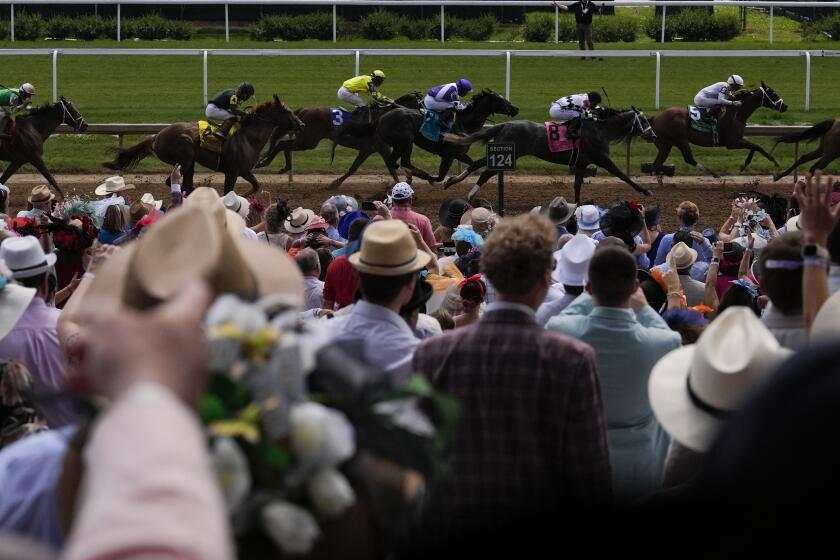Florida Weathers the Storm : Baseball: Lockout has hurt, but not destroyed, the economies of towns that are dependent on revenue from spring training.
- Share via
Spring always arrives early in Sarasota, Fla., but spring training might not arrive at all this year, which has city officials in a bit of an uproar.
This is peak season for the tourist industry. It is supposed to be preseason for the Baltimore Orioles and Chicago White Sox, who train in the area and bring a lot of well-chilled fans south with them. Those baseball dollars are going to be sorely missed if major-league training camps don’t open soon.
So, Sarasota’s city commissioners are considering a resolution that would ask Major League Baseball to reimburse Sarasota for revenues lost as a result of the spring-training lockout.
The city recently spent about $10 million to build a new training facility for the White Sox, under an agreement that guarantees the team will schedule at least 16 exhibition games there each spring. Each game generates about $15,000 in municipal revenues.
But there’s a catch. The White Sox included a lockout-strike clause in their lease agreement, which means the team is not liable for any losses incurred by the city as a result of labor problems.
That’s why city management officials soon might appeal to Major League Baseball to cover Sarasota’s losses. The resolution was drafted this week, but it has been tabled until March in hopes that the labor situation can be resolved in time for the exhibition season to begin.
It would be a largely ceremonial appeal anyway. The resolution would not carry the force of law, and it is apparent that the city recognized the possibility of a lockout when it agreed to the lease with the White Sox. The city fathers just want to voice their frustration, and hope to convince other Florida spring-training cities to do the same.
“Basically, what we are saying is that the cities in Florida have been damaged,” Sarasota City Manager David Sollenberger said. “We’re hoping to send a strong signal of dissatisfaction with the whole situation.”
The proposed action applies only to revenues lost as a result of games canceled at Ed Smith Stadium, which means that the Orioles are not directly involved. They normally would spend the first two weeks of training camp at Twin Lakes Park, a county facility, before moving on to Miami for their home exhibition games. Twin Lakes Park still will be used for the Orioles’ minor-league camp, so there is no county revenue impact.
“We have a sizable investment in our stadium,” Sollenberger said, “plus maintenance and operating expenses--which can run from $150,000 to $200,000 per year. Plus, it affects a lot of people here. There’s the tourist impact, and there are a lot of people who live here who like the games.”
Sarasota is not the only Florida city singing the lockout blues. In fact, it might be better prepared than some to deal with the absence of exhibition baseball.
“We get a lot of tourists regardless,” Sollenberger said. “This is our high tourism season, so the hotels and motels are jammed as it is. I don’t know what the impact would be. When the city was floating a bond issue for the stadium, I recall seeing studies that estimated the impact as $9 (million) to $10 million.”
That isn’t enough of a loss to turn Sarasota into a financial disaster area, but what about the smaller Florida communities that depend heavily on spring training to pump up the economy?
In Winter Haven, an inland community that plays spring host to the Boston Red Sox, the fallout from baseball’s labor impasse could be very discomforting to the year-round population of 25,000. It is a citrus town that is trying to bounce back from a record frost that caused $600 million in crop damage statewide. Now, Winter Haven also stands to lose as much as $10 million in tourist revenues if the exhibition season is canceled.
“A lot of our local employees were already reeling because of the freeze, and it’ll just be terrible if spring training is canceled,” hotel manager Henry Philpot told The New York Times .
Philpot’s 325-unit Holiday Inn has set aside almost half its rooms for the Red Sox. The rest are booked largely by vacationing Red Sox fans.
“This is the time of year that a waitress who makes $2.01 an hour is going to be getting extra tips for six or eight weeks, money she really needs this year, especially if her husband works in the groves,” Philpot said.
“Plus, we hire extra people and give out overtime, and all of that is money that folks here have come to depend on year after year.”
Dunedin, Fla., population 35,000, recently built a $2.2 million stadium for the Toronto Blue Jays, and was looking forward to about $300,000 in spring-training revenue. There are stadium bonds to pay, but the city got more favorable lockout language than Sarasota.
The Blue Jays apparently will have to cover direct losses suffered by the city, but every spring-training town in Florida and Arizona figures to lose tourist and tax revenues that far outweigh losses tied to ticket sales and concessions. Still, the situation probably looks worse than it actually is.
Government officials in Florida estimate that a total spring-training shutdown would cost the state more than $300 million, but that represents only about one percent of the annual revenue generated by the state’s $30 billion tourist industry. Florida tourism depends much more on beach balls than baseballs, with Disney World thrown in for good measure.
The spring-training misery index figures to be higher in Arizona, where isolated communities such as Yuma and Chandler have only baseball and sunshine for sale.
More to Read
Go beyond the scoreboard
Get the latest on L.A.'s teams in the daily Sports Report newsletter.
You may occasionally receive promotional content from the Los Angeles Times.








